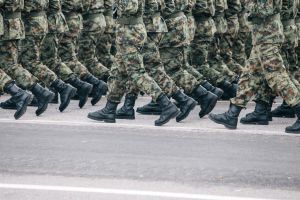Uganda IDPs Continue to Suffer in World's ''Greatest Neglected Emergency''
Although the emergency in war-torn nation is subsiding, displaced persons in Uganda are still ''very miserable,'' said the Church of Uganda
A heavy rainstorm devastated the largest camp for war-displaced people in northern Uganda on Sunday, bringing down 3,700 huts and leaving nearly 15,000 people in the cold, government officials said. The camp, located about 250 miles north of the capital Kampala, is home to 62,000 people displaced by the civil war between government forces and the Lord's Resistance Army.
Although the emergency in war-torn nation is subsiding, displaced persons in Uganda are still “very miserable,” said the Church of Uganda, a member of the global alliance Action by Churches Together (ACT) International.
“There is an acute shortage of food, poor sanitation leading to poor health generally, but in particular among children,” the Church of Uganda reported.
The displacement of people, many of whom fled to camps, has been a result of an 18-year rebellion against the government of Uganda by the Lord's Resistance Army (LRA) in the north of Uganda. According to the United Nations, some two million people have been uprooted by the conflict.
The Church of Uganda reported that some parents have been sneaking back to their villages to harvest cassava from their gardens to feed their families, but a number of them have been ambushed or killed. In one camp, it was reported that 15 parents were missing after trying to get food from their villages.
While there has been little food for residents inside the camps, the security conditions there are safe, the church reports. People would like to return to their homes, but the government has not given permission for them to do so because of generally unsafe conditions outside the camps due to sporadic LRA attacks.
The church also said that there are many groups roaming around the camps in search of food and people to ambush. “This has caused a lot of fear in the IDPs [internally displaced persons], and they are not moving out of the camps yet. Some have moved to camps where there is land to cultivate so that they can get food of their own,” the church reports.
In addition to the kitchen-related items distributed in camps, the Church of Uganda has distributed tarpaulins for shelter, blankets and food items. On average, families received 22 lbs of maize flour and 11 lbs of beans.
Four months through its six-month response, which began when an ACT appeal to assist the internally displaced was issued on June 2, 2004, the church has been able to assist 7,086 households, or 44,217 people. It has received $142,000, or 65 percent of the appeal’s target of $217,633.
According to ACT, the Church of Uganda has been able to work in only half of the planned 16 camps it targeted for assistance because of partial funding for the appeal. The church has focused on providing emergency relief items and addressing its goal to reduce hunger among vulnerable groups, especially children, mothers, people with disabilities, child-headed families and providing non-food items to families with children under the age of 5. It will also provide hoes, axes and seeds to displaced people living in relatively peaceful areas who have access to land for growing food.
“If the church receives additional funding for its appeal, it will be able to provide farming assistance for residents of other camps,” ACT reported.
At a recent debriefing on the crisis in Uganda and Sudan, under-secretary-general for humanitarian affairs and relief, Jan Egeland called Uganda the world’s “greatest neglected emergency,” requesting that the Security Council intervene in the “moral outrage.”
Egeland said noted that hundreds of thousands of Ugandans forced to flee from their homes and some 20,000 kidnapped children, many of whom have been coerced into fighting for rebel movements such as the LRA.
"For me, the situation is a moral outrage, but I'm heartened that the Security Council devoted so much time to northern Uganda,” Egeland told journalists.
In a more positive note, Egeland said he had discerned signs from Uganda's government that more was being done to protect the humanitarian efforts, with new legal provisions for internally displaced people.





























